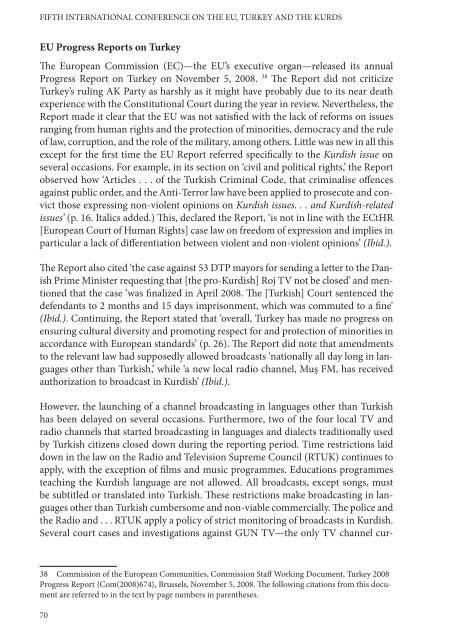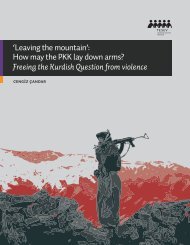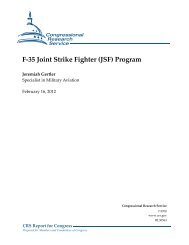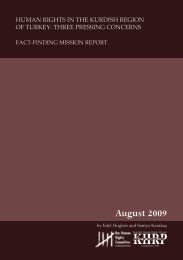FIFTH INTERNATIONAL CONFERENCE ON THE EU TURKEY AND THE KURDS
fifth international conference on the eu, turkey and the kurds
fifth international conference on the eu, turkey and the kurds
Create successful ePaper yourself
Turn your PDF publications into a flip-book with our unique Google optimized e-Paper software.
<strong>FIFTH</strong> <strong>INTERNATI<strong>ON</strong>AL</strong> <strong>C<strong>ON</strong>FERENCE</strong> <strong>ON</strong> <strong>THE</strong> <strong>EU</strong>, <strong>TURKEY</strong> <strong>AND</strong> <strong>THE</strong> <strong>KURDS</strong><br />
<strong>EU</strong> Progress Reports on Turkey<br />
The European Commission (EC)—the <strong>EU</strong>’s executive organ—released its annual<br />
Progress Report on Turkey on November 5, 2008. 38 The Report did not criticize<br />
Turkey’s ruling AK Party as harshly as it might have probably due to its near death<br />
experience with the Constitutional Court during the year in review. Nevertheless, the<br />
Report made it clear that the <strong>EU</strong> was not satisfied with the lack of reforms on issues<br />
ranging from human rights and the protection of minorities, democracy and the rule<br />
of law, corruption, and the role of the military, among others. Little was new in all this<br />
except for the first time the <strong>EU</strong> Report referred specifically to the Kurdish issue on<br />
several occasions. For example, in its section on ‘civil and political rights,’ the Report<br />
observed how ‘Articles . . . of the Turkish Criminal Code, that criminalise offences<br />
against public order, and the Anti-Terror law have been applied to prosecute and convict<br />
those expressing non-violent opinions on Kurdish issues. . . and Kurdish-related<br />
issues’ (p. 16. Italics added.) This, declared the Report, ‘is not in line with the ECtHR<br />
[European Court of Human Rights] case law on freedom of expression and implies in<br />
particular a lack of differentiation between violent and non-violent opinions’ (Ibid.).<br />
The Report also cited ‘the case against 53 DTP mayors for sending a letter to the Danish<br />
Prime Minister requesting that [the pro-Kurdish] Roj TV not be closed’ and mentioned<br />
that the case ‘was finalized in April 2008. The [Turkish] Court sentenced the<br />
defendants to 2 months and 15 days imprisonment, which was commuted to a fine’<br />
(Ibid.). Continuing, the Report stated that ‘overall, Turkey has made no progress on<br />
ensuring cultural diversity and promoting respect for and protection of minorities in<br />
accordance with European standards’ (p. 26). The Report did note that amendments<br />
to the relevant law had supposedly allowed broadcasts ‘nationally all day long in languages<br />
other than Turkish,’ while ‘a new local radio channel, Muş FM, has received<br />
authorization to broadcast in Kurdish’ (Ibid.).<br />
However, the launching of a channel broadcasting in languages other than Turkish<br />
has been delayed on several occasions. Furthermore, two of the four local TV and<br />
radio channels that started broadcasting in languages and dialects traditionally used<br />
by Turkish citizens closed down during the reporting period. Time restrictions laid<br />
down in the law on the Radio and Television Supreme Council (RTUK) continues to<br />
apply, with the exception of films and music programmes. Educations programmes<br />
teaching the Kurdish language are not allowed. All broadcasts, except songs, must<br />
be subtitled or translated into Turkish. These restrictions make broadcasting in languages<br />
other than Turkish cumbersome and non-viable commercially. The police and<br />
the Radio and . . . RTUK apply a policy of strict monitoring of broadcasts in Kurdish.<br />
Several court cases and investigations against GUN TV—the only TV channel cur-<br />
38 Commission of the European Communities, Commission Staff Working Document, Turkey 2008<br />
Progress Report {Com(2008)674}, Brussels, November 5, 2008. The following citations from this document<br />
are referred to in the text by page numbers in parentheses.<br />
70





